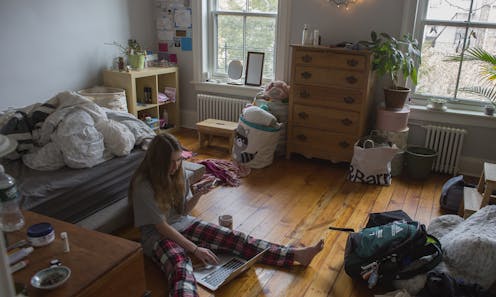With schools everywhere suspended, an education expert answers 4 questions about the upheaval
- Written by Jon Pedersen, Dean of the College of Education, University of South Carolina

Most of the school systems that shut their doors due to the COVID-19 outbreak initially said these closures would be temporary. But health authorities[1] warn that Americans may need to keep up their social distancing[2] for months. Jon Pedersen[3], dean of the University of South Carolina College of Education, answers some key questions about how this unprecedented situation might affect the education of millions of children.
Will kids learn anything while schools are closed?
Not all school systems are going to count schoolwork done while schools are closed toward grades. Educators will have to figure out how to motivate kids to do what it takes to keep learning. If dull worksheets don’t excite kids at school, then those worksheets really won’t work at home.
Teachers will have to be more creative and resourceful than ever with what they do while classes are suspended. For example, they can take students on virtual classroom field trips to places like the National Aquarium[4] in Baltimore. Kids can see everything from wild bears in Alaska to classical music concerts through the Virtual School Activities[5] website. They can learn how to conduct science experiments and make collages that look like kooky monsters at Fun Learning for Kids[6], which has a multitude of activities children will enjoy.
In addition, the New York Public Library[7] has more than 300,000 books you can download for free.
There are also options for children with special needs, such as Educational Technology and Mobile Learning[8] – a great resource for activities for dyslexic learners, autistic learners, apps for the visually impaired and apps for learners with writing difficulties.
Parents will also have a role to play.
Will anyone have to repeat a grade or not graduate as expected?
We don’t know how long this crisis will last.
If it drags on, every state and school will have to decide whether students should move on to the next grade or graduate. Not promoting students or not graduating seniors would obviously have broad implications for all public schools, colleges and universities – including community colleges. There will also be fallout for families and the workforce.
It may be hard in part to see whether students are ready to move forward to the next grade because the federal government has authorized states to let public schools skip otherwise mandatory standardized tests[9] this school year.
When could lost time be made up?
There are options, some more challenging then others. For example, local districts could switch to year-round schooling, extend their current or upcoming academic year beyond the usual minimum of around 180 instructional days[10], lengthen school days and skip some holidays once things are back to normal.
There are precedents for those arrangements. Numerous schools already operate year-round[11] or with longer school years in places like El Paso, Texas; Romeoville, Illinois; and Bardstown, Kentucky. And countless schools have had to extend the school year by days, weeks or more due to closures brought about by blizzards[12], hurricanes, floods and other disasters.
But whatever school leaders decide to do, it’s going to come with serious consequences and costs. Adding instructional time at a future date will cost more money.
And it’s not clear how school districts will be able to foot the bill.
Are there any grounds for optimism?
Yes. I believe that the United States has some of the best teachers and professional educators in the world and we will come through this not losing ground.
Although I would not rule out some sort of extended school year for schools, I do believe that the rapid response of states, districts, schools and teachers have reduced the likelihood that extreme measures will be needed.
My colleague, the education professor Gloria Boutte[13], always starts meetings with a traditional Masai greeting: “How are the children?”
I think this is very appropriate to keep in mind. How are the children? How are they doing? What do we need to do as a community to ensure their success?
Together, we can make sure children succeed.
[Our newsletter explains what’s going on with the coronavirus pandemic. Subscribe now[14].]
References
- ^ health authorities (www.cdc.gov)
- ^ social distancing (theconversation.com)
- ^ Jon Pedersen (sc.edu)
- ^ National Aquarium (dc101.iheart.com)
- ^ Virtual School Activities (virtualschoolactivities.com)
- ^ Fun Learning for Kids (funlearningforkids.com)
- ^ New York Public Library (www.timeout.com)
- ^ Educational Technology and Mobile Learning (www.educatorstechnology.com)
- ^ skip otherwise mandatory standardized tests (chalkbeat.org)
- ^ 180 instructional days (nces.ed.gov)
- ^ schools already operate year-round (www.aasa.org)
- ^ closures brought about by blizzards (dx.doi.org)
- ^ Gloria Boutte (scholar.google.com)
- ^ Our newsletter explains what’s going on with the coronavirus pandemic. Subscribe now (theconversation.com)
Authors: Jon Pedersen, Dean of the College of Education, University of South Carolina

